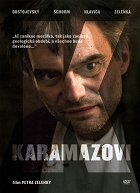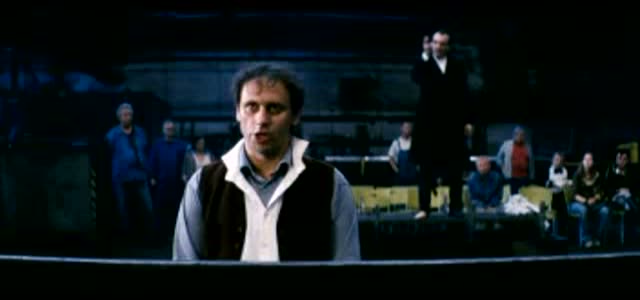Regie:
Petr ZelenkaKamera:
Alexander ŠurkalaMusik:
Jan A.P. KaczmarekBesetzung:
Ivan Trojan, Igor Chmela, Martin Myšička, David Novotný, Radek Holub, Lenka Krobotová, Michaela Badinková, Lucie Žáčková, Marek Matějka, Jan Kolařík (mehr)Inhalte(1)
The story of Petr Zelenka’s movie The Karamazovs takes place in contemporary Poland. A group of actors from Prague, led by a play director, arrive in Krakow to present a theatrical adaptation of Dostoyevski’s novel The Brothers Karamazov at an alternative festival organized in the unconventional environment of a steel mill. The theatrical play, the plot of which evolves around a patricide investigation, tells the story of debaucher and cynic Fyodor Karamazov and his four sons. The issues of faith, immortality, and the redemption of man present themselves as the powerful emotions of love, jealousy, and hatred play out on the makeshift stage of the dilapidated mill. Simultaneous with the rehearsal we observe story lines from the real world, of the cast, and of those who still work in this steel mill. Sometimes the effect is comic, but tragedy waits in the wings. A factory maintenance man learns during the rehearsal that his son, who is in the hospital due to an accident at the mill, has died. The rehearsal continues at the man's request. Suddenly the biggest drama does not take place on stage but in the audience… (Verleiher-Text)
(mehr)Kritiken (8)
Zelenka has imprinted a very specific visage on a strong fabric that would tighten "on its own," which straddles the line between pure art and something "other," which is what so many people call for from Czech cinema. I give Zelenka a standing ovation for the way the film managed to get away from theatricality by not letting itself be carried by the (otherwise without exception top-notch) actors, by giving it a distinctive cinematic shape through editing, cinematography, and especially the music. One of the best Czech films in a long time. Bravo!
()
Ein Film, welchen die tschechische Kinematografie, wie der Henker sein Seil gebraucht hatte. Eigenständig, mit einer starken Autorenvision und sowie einem existenziell beunruhigenden, verdichteten sowie hervorragend strukturierten Inhalt durchwoben. Der tschechische Regisseur Zelenka hat hier von seinem etwas seltsam mystifizierenden "Humor" nichts eingebüßt, jedoch trotz ein paar Skizzen liegt der Fokus der Karamasow in einer brillanten Verknüpfung von Dostojewskis Klassiker und dem menschlichen Drama der "realen" Welt. Die reichhaltigen Dialoge in die Umgebung der rostigen und schmutzigen Welt der Stahlwerke zu führen ist eine wunderbare Idee. Der Kontrast zwischen Tradition und Industrie wirkt überraschenderweise nicht störend, sondern bedeutungsvoll. Der gesamte Film wird zum Theater und das Theater zeigt die ganze Welt. Die Reflexion und Verflechtung von "Mimesis" und "Realität" wirkt einfach faszinierend. Unglaubliche schauspielerische Leistungen. Zelenka hat es geschafft, das große Theater mit Filmreden, einer großartigen Kameraführung und perfekter musikalischer Begleitung wiederzubeleben. So entstand ein Film, der bei uns schon seit Jahren (wenn überhaupt) nicht mehr gedreht worden ist.
()
I could paraphrase my review on Country Teacher and write something like this: “Now try telling me that European cinema is dead." But I won’t waste time repeating that and so absolutely uncritically (and anything goes, according to Dostoyevsky) I write that, together with Tornatore’s The Unknown Woman, The Brothers Karamazov is the best movie to come out of the continent of Europe this millennium. As a result, this may well seem to many viewers just like a two-hour commercial for Dejvice Theatre (which is an accusation hard to argue with), but unlike the commercial for the Kalich Theatre (that’s right, Kvaska), this is a demonstration to the world of how skillful and talented Prague’s best theatre is right now. And it’s that simple. Believe if or not, or you can try not agreeing. Long live Dejvice! And many more movies from them!
()
In the non-violent line of actors, both the plot and the characters interested me, but since the ensemble delves into their roles and only occasionally pops up to discuss the unfortunate janitor or the unsympathetic director in a few sentences, everything is wrong. What's the point of delving into Russian classics when it's just superficial? Zelenka wanted to shoot an experiment with his friends, but I would rather avoid it. The final scene, which is only present so that the film has some ending, may anger me. The second star is more or less just for the embarrassment of not giving credit to the acting performances beyond the limits of what is possible.
()
The Czech film industry has been struggling for a long time, and its prospects are not rosy. I generally avoid it to prevent disappointment. But to avoid being accused of a lack of patriotism, I tried to choose a title to give a high rating to. The Karamazov Brothers fulfilled that condition, although I must say honestly that the stars are earned more by the classic Dostoevsky and the actors from the Dejvice Theatre than by the director and screenwriter. The adaptation of Dostoevsky, projecting his philosophy into the present day through the family tragedy of a Polish worker, didn't quite succeed, or rather it went beyond the scope of questions raised in his play. As for the actors - and that is the main focus of The Karamazov Brothers - they are a reliable support for the project, and it is regrettable in the case of this generation of actors how limited of a space contemporary Czech cinema offers them. Successful actors from the First Republic or the nationalized film industry were able to encompass hundreds of titles in their filmography, often with remarkable audience and critical responses. The actors from The Karamazov Brothers can only dream of that today... Overall impression: 90%.
()
Dieser Theaterfilm hat den so genannten obligatorischen Respekt verdient. Inszeniert wurde er von dem beliebten Zelenka inszeniert, er huldigte dem beliebten Schorm, gedreht wurde mit den Lieblingen des Theaters von Dejvice inszeniert, und irgendwo ganz unten ist Dostojewski so erlernt wie ein Gedicht. Es ist also nicht möglich, es nicht zu mögen. Das geht nicht. Das gibt es nicht.
()
Ich habe die Vorlage von Dostojewski nicht gelesen, was sicher ein Handicap sein kann, trotzdem habe ich mich in der Handlung nicht verloren und orientierte mich in den einzelnen Charakteren der Hauptgestalten. Wenn Ivan Trojan spielt, dann läuft mir ein kalter Schauer über den Rücken, und der epileptische Anfall von Radek Holub wirkte ebenso stark auf mich. Eindeutig für mich das größte tschechische Filmerlebnis des Jahres 2008.
()
So I have to admit that I quite enjoyed this theater. Petr Zelenka had excellent actors by his side, which was beautifully reflected in how they handled the entire film. The form itself is the decoration of this film, which is actually nothing more than a theatrical play in unexpected exteriors of a non-functioning factory. Strong, intimate, beautiful theater.
()

